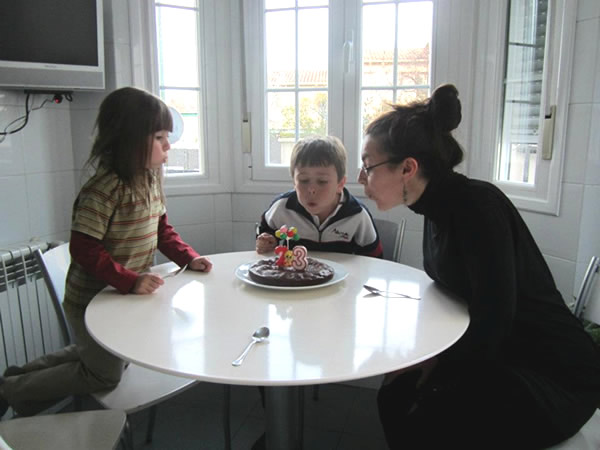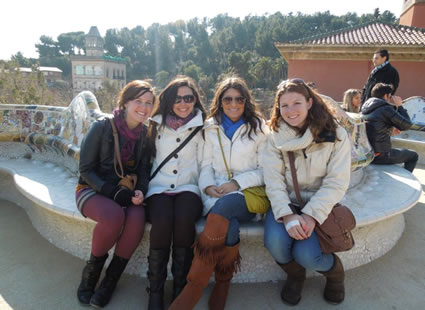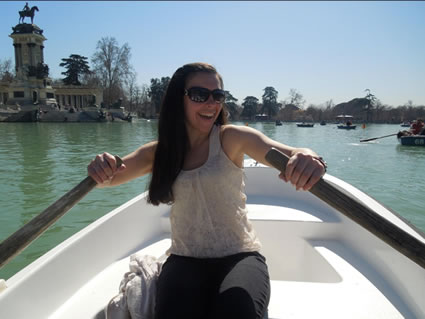Living with a Host Family in Madrid as a Student
A Homestay Experience
Article and photos by Kristen Fonte

|
|
Jaime and Maria, at the homestay in Madrid, helping me blow out my birthday candles.
|
In the seven weeks of living with a host family in Europe, there were only three days that I felt homesick: the day leading up to my birthday, the day of my birthday, and the day after my birthday. My birthday fell smack in the middle of my trip, and I never realized how much I would miss my family and friends back home, with whom I had spent my previous 22 birthdays. However, the homesickness dissipated the second I returned from my weekend trip in Amsterdam back to my host family's house in Madrid, where I was greeted with hugs from the children I tutored throughout the week, a cake for me that they helped their mom make, and two beautiful bracelets they gave me as a present. At that moment, I felt more at home while abroad than at any other time, and completely forgot about being homesick.
I had always felt the itch to travel, but for some reason, the stars were never aligned for me to get the chance to study abroad while in college. Hours were spent trying to find the perfect program, but the search bore no fruit. I wanted to experience a different country but did not know what to do while there. With so many other options available, how do I pick the right one?
Everyone has different interests, and the program I selected was right up my alley. InterExchange offered a program that allowed them to live with a host family in Madrid, Spain, teaching their children English as a Language Assistant for three hours a day, five days a week, in exchange for room and board. One great perk is that you can travel to see anything anywhere in Europe during off hours! It seemed like the program offered the perfect balance of freedom, working, and immersion into another culture.
Getting Started
Once I discovered InterExchange, I made sure to find out all the information about the program. Obviously, you want to spend only some of your time and money on a program that is worth it and waste away a fantastic opportunity of a lifetime. After reading about my options online, I spoke with the program director. I recommend that anyone going away utilize the internet and program websites as much as possible before departing. I explored their website, wrote down any questions I had for the program director, discussed those issues with her personally, and wrote down her answers. Consequently, I knew what I was getting myself into.
Here is a list of the highlights offered by the program that most caught my attention — features that some might not take into consideration:
- Accident and medical insurance — you never know what can happen to you.
- A local affiliate organization could be contacted in case there were any concerns or in the event of any emergencies.
-
A visa was unnecessary in this case as the program's maximum length was three months. A visa is required in Spain for a stay longer than 90 days.
-
There was no need to be fluent in the country's native language before arriving. However, my Spanish has definitely improved since the trip.
- A place to stay and eat while I was in the country for a low fee. Some programs require that you volunteer for more than 8 hours a day and charge you thousands of dollars.
Making Friends
in Spain
Another major concern (arguably the most significant) about going abroad alone is the fear of loneliness. I was going halfway across the world to explore a country I had never been to. I definitely wanted to do everything with others. I made sure to ask the organization before I left regarding getting in touch with others involved in the same program. They sent me a contact list of all the other participants via email. Having such a contact list was extremely helpful as it offered a sense of relaxation, knowing that others were in the same boat. Before leaving for Spain, I emailed a few people and spoke with one of the young women for two hours. We even booked weekend trips around Europe before we departed. While making such plans involved some risk, we both felt we would get along, and I now consider her one of my best friends! I also met several other young women from all over the United States and Europe who were participating in the same program. Because of these young women, there were no great fears about traveling and staying in hostels all over Europe. I traveled to Valencia, Sevilla, Barcelona, Granada, Italy, Amsterdam, and the Canary Islands…something I could have never done alone. I am currently talking with two of my newfound friends from the States about visiting my house in New York this summer!

|
|
Three of my closest friends (Mary, Me, Rachel, and Kirstin) met through the program on a weekend trip to Barcelona. |
Living With a Host Family
At first, living with a family from a different country and speaking an entirely different language was very scary. The more I thought about it, the more the idea became appealing. A host family is a great option when living in a different country because it provides a place to call home while abroad and offers genuine insight into the local culture. I could compare the daily routine of my new family in Spain to my own family back home in the States — and this turned out to be fascinating. In addition, I could eat authentic Spanish food every day, something I could never have done if I had chosen to rent an apartment or live out of my suitcase hostel after hostel. I can tell you with certainty that the best "Tortilla de Patata" and "Pisto" (classic Spanish dishes) I enjoyed were consumed in my host family's kitchen (although I am sure some of my friends from the program would argue that the food was even better in their respective homes!).
It is essential, however, to contact the family before departing to make sure you will be a good fit for each other. Feel free to ask as many questions as you wish, and ask them to question you. All the families in this program are required to be at least semi-fluent in English, so I made sure to ask them a variety of questions, including what things I should pack (toiletries, towels, clothes to wear) if they had any pets, what my teaching schedule would be, and what type of transportation I would use to get around Madrid. I also asked the organization if the family had had any previous language assistants. My family had just had someone live with them a couple months previously, so I contacted her and got the inside scoop about the family. When she told me that this family was very relaxed, friendly, and welcoming, it put my nerves at ease.
Finally, make sure you find out how old the children in the home are. I love younger children, so it was exciting to find out that I would be living with a 7-year-old boy (Jaime), a 5-year-old girl (Maria), and a 2-year-old girl (Claudia). A friend in the same program preferred older children and would have had difficulty living in my chosen home.
Day to Day Life in Madrid
After realizing that I would teach only 15 hours a week, the next thought was, "What am I going to do during the week when I'm not teaching?" When speaking with a friend about this concern, he said to me, "Look, the worst that can happen is that you don't meet anyone from your program, and you spend your days venturing to different cafes in Madrid, drinking coffee and reading a good book…that sounds like a pretty good worst scenario." He was right. I was lucky to meet people daily, doing simple things like shopping and eating in Sol (the heart of Madrid), visiting museums, and, a personal favorite, sitting in Retiro Park reading books and renting row boats on beautiful sunny days. There were days, however, when I did not meet up with anyone and just spent time near my host family's home at a local café. Some of my fondest memories of Madrid are those days spent alone, collecting my thoughts, and being thankful for the chance to spend time in Europe.

|
|
Rowing a boat in Retiro Park.
|
Then there are the Intercambio groups, a great way to meet people in your area who are also looking to learn a language and make new friends. I only went to one and wish more time had been set aside to go back because it is incredible how much you can learn interacting with people from different cultures. The informal meet-ups are usually held at local bars or bookstores, having an "Intercambio night." You can research them online by typing "Intercambio Groups in Madrid" into your search engine or wherever you are in Spain.
Saying Goodbye
Of course, when it was time to head home, the weather in Madrid was beyond beautiful every day, and I was even more attached to Jaime, Maria, and Claudia than I ever imagined. Saying goodbye to them was tough…they asked me to tuck them into bed the night before leaving, which made my eyes swell with tears and want to curl right up next to them. Add into the mix saying goodbye to all the friends I made abroad; those last few days were incredibly bittersweet.
While I was thrilled to come home to see my family and friends, I wish a few more weeks had remained to enjoy the remarkable city of Madrid and explore more of Europe. The best part about coming home is telling everyone about your exciting stories and experiences to make them jealous of you!
|
For More Info
I hope I have provided some information to help you make an informed decision about traveling abroad. I will forever be highly jealous of anyone getting ready to embark on the journey of a lifetime, no matter what type of program or destination you choose. Here are some websites that can provide you with a variety of options for going abroad:
|
Kristen Fonte is from Long Island, NY. She graduated from the University of Delaware with a Bachelors of Science in Human Services and plans on starting my Master's in Occupational Therapy at SUNY Downstate. During her year off, she took her 7-week trip to Spain.
|
